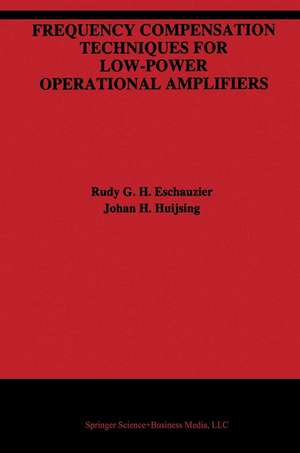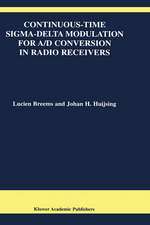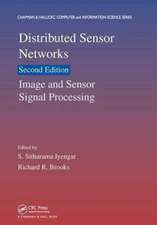Frequency Compensation Techniques for Low-Power Operational Amplifiers: The Springer International Series in Engineering and Computer Science, cartea 313
Autor Rudy G.H. Eschauzier, Johan Huijsingen Limba Engleză Paperback – 17 sep 2011
The book bridges the gap between the professional designer's needs and available techniques for frequency compensation. It does so by explaining existing techniques and introducing several new techniques including Hybrid Nested Miller compensation, Multipath Miller Zero cancellation and Multipath Conditionally Stable compensation. All compensation techniques are treated in a stage-number-based order, progressing from a single transistor to circuits with six stages and more. Apart from discussing the mathematical basis of the compensation methods, the book provides the reader with the factual information that is required for practicing the design of integrated feedback amplifiers and many worked out examples. What is more, many bipolar and CMOS operational amplifier realizations, along with their measurement results, prove the effectiveness of the compensation techniques in real-life circuits.
The text focuses on low-voltage, low-power integrated amplifiers. Many of the presented bipolar circuits operate at supply voltages down to 1V, while several CMOS amplifiers that function correctly just slightly above this voltage are demonstrated. The lowest measured power consumption amounts to 17muW for a class AB CMOS opAmp with 120dB gain. Despite this attention to low voltage and low power, the frequency compensation strategies provided are universally applicable. The fundamental approach followed leads to efficient compensation strategies that are well guarded against the parameter variations inherent to the mass-fabrication of integrated circuits.
The book is essential reading for practicing analog design engineers and researchers in the field. It is also suitable as a text for an advanced course on the subject.
| Toate formatele și edițiile | Preț | Express |
|---|---|---|
| Paperback (1) | 1215.22 lei 43-57 zile | |
| Springer Us – 17 sep 2011 | 1215.22 lei 43-57 zile | |
| Hardback (1) | 1220.12 lei 43-57 zile | |
| Springer Us – 31 mar 1995 | 1220.12 lei 43-57 zile |
Din seria The Springer International Series in Engineering and Computer Science
- 24%
 Preț: 1041.98 lei
Preț: 1041.98 lei - 20%
 Preț: 643.50 lei
Preț: 643.50 lei - 18%
 Preț: 1225.62 lei
Preț: 1225.62 lei - 18%
 Preț: 965.02 lei
Preț: 965.02 lei - 20%
 Preț: 646.12 lei
Preț: 646.12 lei - 18%
 Preț: 948.79 lei
Preț: 948.79 lei - 20%
 Preț: 646.62 lei
Preț: 646.62 lei - 15%
 Preț: 637.46 lei
Preț: 637.46 lei - 20%
 Preț: 643.83 lei
Preț: 643.83 lei - 18%
 Preț: 949.23 lei
Preț: 949.23 lei - 20%
 Preț: 644.48 lei
Preț: 644.48 lei - 20%
 Preț: 994.92 lei
Preț: 994.92 lei - 20%
 Preț: 645.97 lei
Preț: 645.97 lei - 18%
 Preț: 946.87 lei
Preț: 946.87 lei - 20%
 Preț: 995.57 lei
Preț: 995.57 lei - 18%
 Preț: 956.99 lei
Preț: 956.99 lei - 20%
 Preț: 644.98 lei
Preț: 644.98 lei - 15%
 Preț: 649.54 lei
Preț: 649.54 lei - 18%
 Preț: 950.21 lei
Preț: 950.21 lei - 18%
 Preț: 1221.38 lei
Preț: 1221.38 lei - 18%
 Preț: 957.62 lei
Preț: 957.62 lei - 15%
 Preț: 643.99 lei
Preț: 643.99 lei - 18%
 Preț: 948.47 lei
Preț: 948.47 lei - 18%
 Preț: 947.35 lei
Preț: 947.35 lei - 20%
 Preț: 1284.65 lei
Preț: 1284.65 lei - 20%
 Preț: 1628.31 lei
Preț: 1628.31 lei - 20%
 Preț: 1285.78 lei
Preț: 1285.78 lei
Preț: 1215.22 lei
Preț vechi: 1481.97 lei
-18% Nou
Puncte Express: 1823
Preț estimativ în valută:
232.61€ • 252.75$ • 195.52£
232.61€ • 252.75$ • 195.52£
Carte tipărită la comandă
Livrare economică 21 aprilie-05 mai
Preluare comenzi: 021 569.72.76
Specificații
ISBN-13: 9781441951540
ISBN-10: 1441951547
Pagini: 264
Ilustrații: XVI, 245 p.
Dimensiuni: 155 x 235 x 14 mm
Greutate: 0.37 kg
Ediția:Softcover reprint of the original 1st ed. 1995
Editura: Springer Us
Colecția Springer
Seria The Springer International Series in Engineering and Computer Science
Locul publicării:New York, NY, United States
ISBN-10: 1441951547
Pagini: 264
Ilustrații: XVI, 245 p.
Dimensiuni: 155 x 235 x 14 mm
Greutate: 0.37 kg
Ediția:Softcover reprint of the original 1st ed. 1995
Editura: Springer Us
Colecția Springer
Seria The Springer International Series in Engineering and Computer Science
Locul publicării:New York, NY, United States
Public țintă
ResearchCuprins
1. Introduction.- 2. Properties of Feedback Circuits.- 3. Stability of Feedback Circuits.- 4. Basic Frequency Compensation of Integrated Circuits.- 5. Multistage Compensation Techniques.- 6. Multipath Compensation Techniques.- 7. Realizations.

























